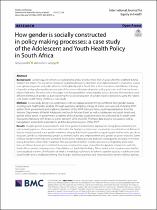| dc.contributor.author | Jacobs, Tanya | |
| dc.contributor.author | George, Asha S | |
| dc.date.accessioned | 2023-04-12T08:18:31Z | |
| dc.date.available | 2023-04-12T08:18:31Z | |
| dc.date.issued | 2023 | |
| dc.identifier.citation | Jacobs, T. and George, A.S., 2023. How gender is socially constructed in policy making processes: a case study of the Adolescent and Youth Health Policy in South Africa. International Journal for Equity in Health, 22(1), p.36. | en_US |
| dc.identifier.uri | https://doi.org/10.1186/s12939-022-01819-w | |
| dc.identifier.uri | http://hdl.handle.net/10566/8754 | |
| dc.description.abstract | Background: Gender equality remains an outstanding global priority, more than 25 years after the landmark Beijing Platform for Action. The disconnect between global health policy intentions and implementation is shaped by several conceptual, pragmatic and political factors, both globally and in South Africa. Actor narratives and different framings of gender and gender equality are one part of the contested nature of gender policy processes and their implementation challenges. The main aim of this paper is to foreground the range of policy actors, describe their narratives and different framings of gender, as part exploring the social construction of gender in policy processes, using the Adolescent Youth Health Policy (AYHP) as a case study. | en_US |
| dc.language.iso | en | en_US |
| dc.publisher | International Journal for Equity in Health | en_US |
| dc.subject | Adolescent Youth Health Policy (AYHP) | en_US |
| dc.subject | policy process | en_US |
| dc.subject | gender | en_US |
| dc.subject | actors | en_US |
| dc.subject | South Africa | en_US |
| dc.title | How gender is socially constructed in policy making processes: a case study of the adolescent and youth health policy in South Africa | en_US |
| dc.type | Article | en_US |

